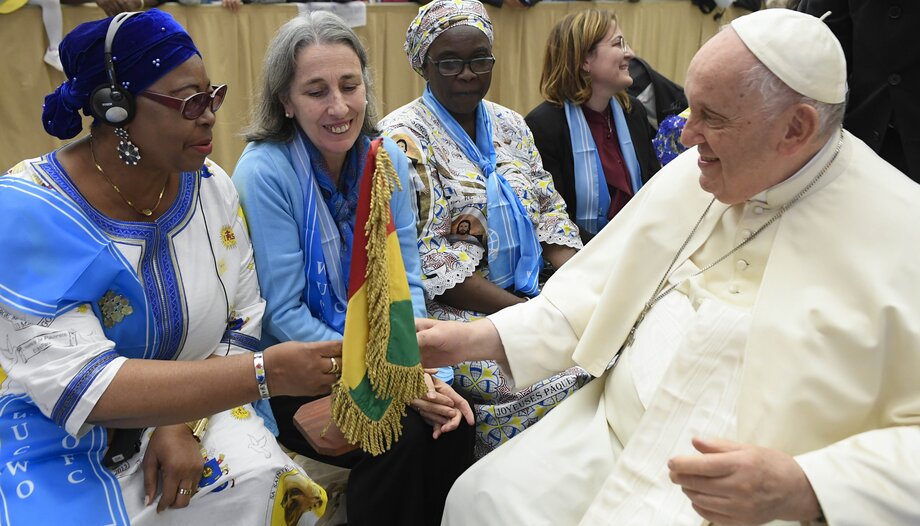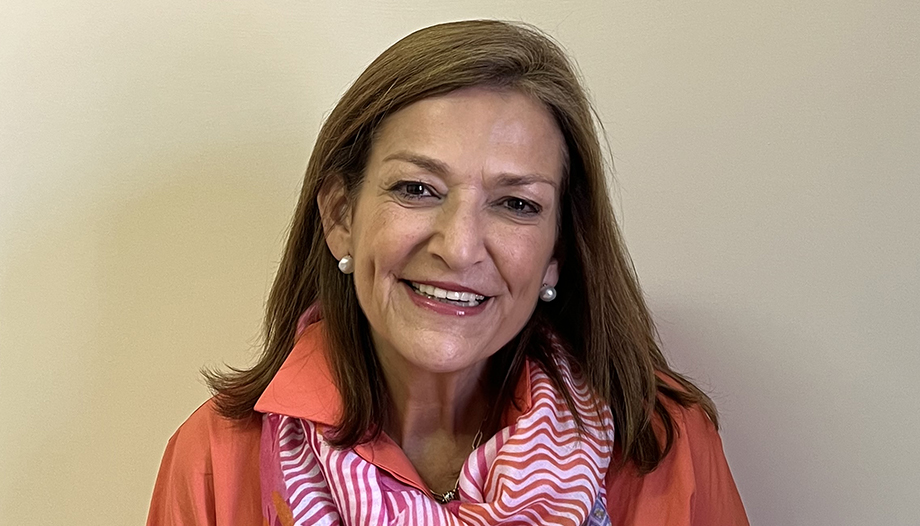Mónica Santamarina is the new President of the World Union of Catholic Women's Organizations (WUCWO), which she defines as "a large network of Catholic women". Not only that, it is the "only international public association of the faithful in the Catholic Church that represents women".
As WUCWO itself explains on its website, this organization's mission is to "promote the presence, participation and co-responsibility of Catholic women in society and in the Church, so that they can fulfill their evangelizing mission and work for human development".
In this interview with Omnes, Santamarina talks about how to defend the role of women without falling into extremism, the meeting that took place with the Papa and answers one of the most difficult questions of the moment: What is a woman?
What is the importance of an institution like WUCWO?
- To see the importance of the institution, I think the first thing to look at is that it has almost 100 organizations and is present in nearly 60 countries. We represent more than eight million women, which gives you the magnitude of the possibilities that this institution has.
In the WUCWO's executive body, what we do is to see the needs of our women at the grassroots, the needs of their communities, their training needs. We try to generate the instruments to respond to those needs.
On the other hand, the importance of WUCWO is the way in which the voice of women can reach international institutions and organizations. We are in ECOSOC, in the Human Rights Council, in FAO, the Council of Europe, in UNESCO...
And we can also reach out to the Dicasteries and say what the women of the world are living, what they are asking for and, at the same time, to ask what the Church needs from women. We want to establish a dialogue in synodality, listening to each other, working together.
Women need to have greater participation, but we also need to be better educated. Finally, with all this dialogue and representation, we have the opportunity to give a voice to those who did not have one.
We work very closely with the dicasteries, especially the dicastery for the laity, family and life, and as closely as we can with our women. We try to get down to the grassroots. I think that's the richest and most interesting thing about WUCWO, especially at this time.
Within this dynamic of dialogue, what do you consider to be the great contributions that women, from their femininity, can make to the Church?
- A lot of them. The female vision of things is different from the male perspective, so we have to work together, hand in hand. Reciprocally and co-responsibly. Within the Church, the majority of active members are women, but many times our voice is not heard.
Who are closest to the marriages and children? Who experience poverty and violence the most? We are the women. Therefore, we have a very important mission in this aspect within the Church. It is a mission that we have fulfilled, but we must fulfill it better hand in hand with men.
It is time to work together, each one in his role because all roles are important. We are all co-responsible.
How can we defend the figure and role of women without falling into radical positions?
- It is a challenge that we face. I believe that the first thing to do is to look at the Magisterium and the Pope as our guide. If we have a clear guide, if we listen to it, understand it and study it, we will not get lost. The Church teaches us and gives us the instruments so that we can all participate in the decisions that are made. Therefore, a first essential thing is to orient ourselves.
If we want changes in the Church, we must change the Church from within, not from outside. This is not a quarrel, a polarization. We have to learn to listen to each other, to approach each other in common.
The important thing is not to lose the guide, to be within the Church and the Magisterium. And also to participate more in the creation of this Magisterium, for which we have to be more prepared.
How can we, on a daily basis, promote the presence and participation of women in the Church?
- First of all, women have to believe what they are worth. The first problem is that sometimes we do not value ourselves, we do not recognize our worth. We have to be aware of all that God gave us, that we have great dignity, equal to that of men. We must also understand that we have a different vision from them and that is why we are complementary. The idea is not to take the men out and let us in, that doesn't work. We have to work together, otherwise we cannot move forward.
Women have to prepare themselves, they must be more and more prepared in theology, education and in all areas, even in the pastoral field. It is important that they acquire training, that they have the tools to speak in public. In these aspects there is a very big gap that the pandemic has worsened.
But women also have to be brave enough to speak up and take their place. Not only that, she has to ask for it. She has to ask for it with respect, but sometimes she has to ask for it with a loud voice. It's not about shouting, it's about asking for it firmly. We have a place that we are not occupying and it is not a question of blame.
It is a whole process that we must follow, but avoiding extremism. Extremisms do not solve anything, they lead you to go outside the margins marked by the Magisterium. They push you to try to change the Church from the outside, instead of doing it from the inside. All the great changes have come from within.
There is a question that is very popular right now that we want to ask you to answer as you wish: What is a woman?
- A woman is a wonderful creature of God, who has a great capacity to give love. We women have a great capacity to give ourselves, for example, when we talk about motherhood, which does not necessarily have to be physical but is also spiritual.
I always thank God for being a woman. I don't want to fight with men. I have sons and daughters, grandsons and granddaughters. I greatly appreciate the value of each one.
Now, being a woman implies that you have a certain vocation that calls you to be close to others. Because of the way you are, you have a special sensitivity to listen, to understand those who are suffering, to get close to others, to dialogue. We can care for others, care for humanity.
Men and women see things differently and this enriches the Church. We all have the same dignity, but very different ways of doing the things we have to do that are complementary.
For me, a woman is a creature of God who has enormous possibilities, with enormous values. God created us very well, but we have to believe it. We must be sure that we are worth a lot and that we can always improve.
Pope Francis has worked hard to involve women more in the Church. WUCWO has recently met with him, can you tell us something about this meeting?
- It was a beautiful meeting. About 1600 women and their families came. In WUCWOF we have always loved Father very much, we feel a great affection for Pope Francis and the people were very excited.
We thanked the Pope for all he has done for women and for the Church. We presented to him the results of the latest projects of the Observatory, which we know is something he likes because we are dedicated to making the invisible visible. We gave him the results of the projects in Latin America and Africa, and of the Synodality and women project. She liked it very much and urged us to continue working, to continue living our femininity to the full.

I think we have to make our daughters, our granddaughters and young people proud to be women. It is something we have lost a little bit, but why shouldn't we be proud to be women? The Pope asked us to give ourselves to the Gospel with our heads, with our hands, with our feet and with everything we have.
Francis told us to go to the assembly, to discuss, even fight a little, but we have to dialogue. He encouraged us to go ahead with the Observatory, which is a mechanism through which the Church is learning. The first one we show the results to is the Dicastery.
I think it was a very loving encounter. The Pope looked very happy. All this helps a lot and we could really see Francis as our father, as a guide.
As WUCWOU President, what current project are you most excited about?
- I am excited that the Observatory will continue and consolidate, because it is bearing much fruit. Women are being listened to and attended to, we are making noise. It is a work for all women, not only those of WUCWO.
I am looking forward to working hard to form us in synodality and the formation of women in general. In particular, we want to make WUCWO attractive to young women. We need to reach out to them, to have the flexibility and the mechanisms to reach out to them.
We want to rescue the path of the family, of motherhood and fatherhood. In the media, in this polarized world, everything seems bad and people no longer want to get married. There is fear of commitment because it is no longer seen as something beautiful. We want to rescue the beauty of the marriage journey. Obviously, we also want to keep single women and their beauty, there are women who for different circumstances have been left alone and we want to give them special attention.
Another fundamental issue for me is that of migrants; we want to build a new future with migrants and refugees. It is a day we have to work hard today.
On the other hand, we are in the year of synodality and we have to be deeply involved in it. It is an opportunity to form all of us.
What message do you want to give to young women in the Church?
- Do not lose hope, the Church and the Lord are waiting for you. The Lord is with you, the Church is with you. Come to God by the way that is closest to you. Seek us, and we too will seek you. Try to dialogue, tell us your needs and your fears. Talk to us.
You have to know that it is possible to be happy, it is possible to be happy following the Church. You can be happy, even with all that we are living. It is a challenge, but you have to change the world. This is your world and you have to decide what kind of world you want.
Seek dialogue, get closer. Intergenerational dialogue is very rich. You teach us a lot and we can also teach you. We have a lot to contribute and together we can grow a lot.
I insist, do not lose hope. Recover it.








